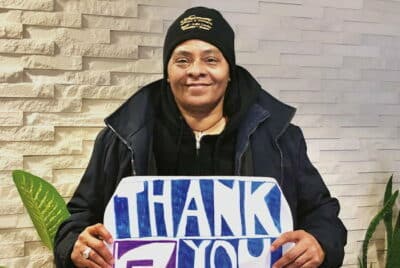Tucker & Margaret
Click to view a short message from Tucker and Margaret!
Read Full Story“As a woman who had lost her safe place to live and her home at the hands of people she trusted, N Street Village provided me a place to heal, receive a kind word, a smile, lots of laughter, and the ability to begin dreaming again.”
Paula arrived at N Street Village in 2016, carrying everything she owned in three bags and towing years of bitterness, anger, and despair.
Paula had a successful career for 16 years, a husband, and two sons. Then she got the call from her sister – her father had been diagnosed with Alzheimer’s and needed help. She uprooted her family, left everything behind, and came back to her childhood home in D.C. to care for her dad. A few years after moving her husband passed away suddenly from a heart attack. Four months later, her father died.
In an instant, Paula’s entire life changed. She found herself a widow, with nowhere to go, no money, no job, and two young sons. She and her sons were living in her car, sleeping with a knife for protection, and pawning the precious few belongings they had left to buy food. When her youngest son got sick, Paula sold the car in order to get a hotel room. That money soon ran out.
“I laid out all the cash I had left on the bed and counted it. It wasn’t going to be enough for another night at the hotel.”
Paula found a safe place for her sons with friends, but she had nowhere else to turn. She called the Shelter Hotline and arrived on the doorstep of N Street Village on a Friday afternoon. She was able to get a bed at N Street Village’s newly opened emergency shelter, the Patricia Handy Place for Women. She came back to the Village flagship site on Monday ready to do the work necessary to get her life and independence back. She started taking classes, getting involved in the community, and doing everything she could to use the tools and resources around her.
“I thought the classes were about learning – learning how to use computers, how to do yoga, how to make jewelry – but looking back, I’ve come to realize they were about healing the entire time.”
Paula began to take advantage of everything the Village – and the city – had to offer.
“I’d spent my entire life taking care of everyone else – taking care of my husband, taking care of my family, taking care of my father, taking care of my sons. It’d always been about someone else. Now it’s finally about me.”
Today, Paula has completed “Back to Work at 50+,” a highly-competitive multi-week course. She is living in a nearby shelter and working to move into her own apartment. Paula has started making jewelry and is talking about what it would take to start a small business once she has more permanent housing. She is hopeful about her next chapter.
“I wasn’t responsible for becoming homeless. But I am 100% responsible for what I do with my life afterward. I don’t know what’s next for the second half of my life, but I do know there’s excitement in everything I’m able to do and try now.”

Keep up with the latest news and events by signing up
for News & Updates.